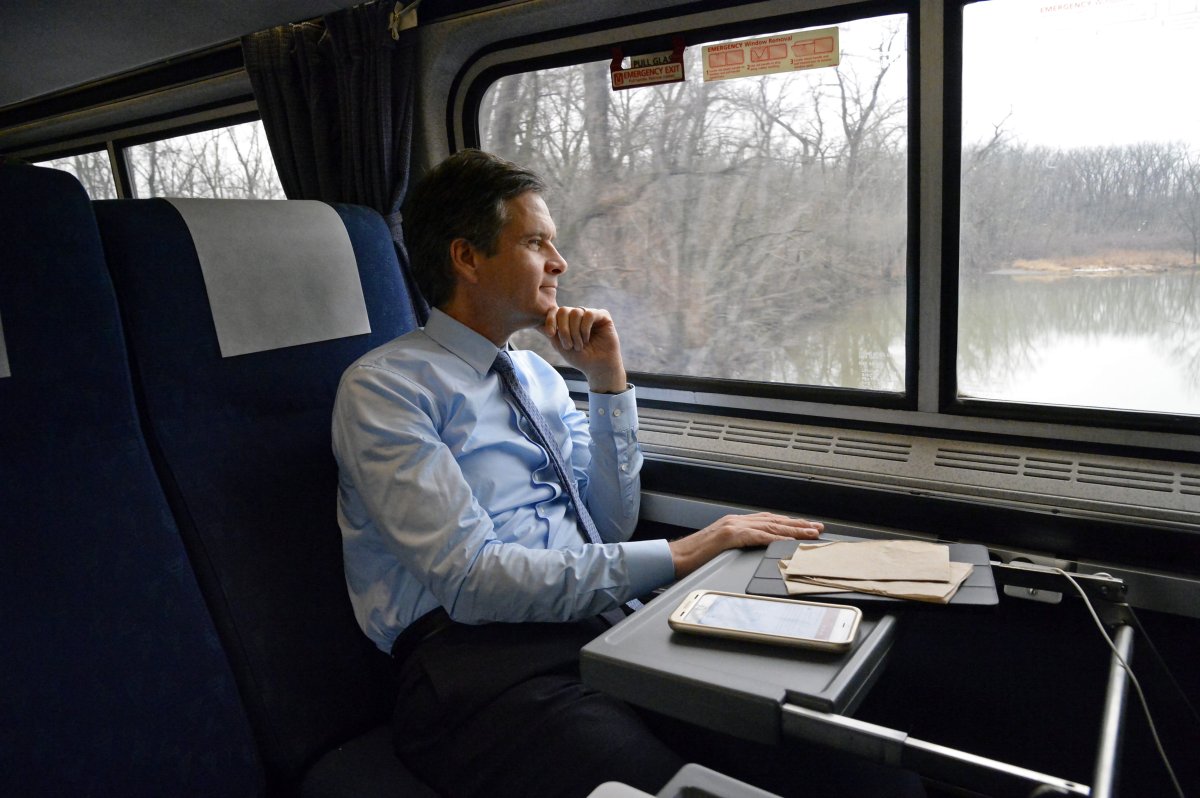BY JEFFERSON SIEGEL | Wed., Jan. 4, was the first day of the new legislative session at the state capitol. Just after 7 a.m. that morning, state Senator Brad Hoylman settled into a seat on the Amtrak train to Albany.
Hoylman, 51, was elected to the state Senate in 2012 after serving as chairperson of Community Board 2 and as Greenwich Village’s Democratic district leader.
In between reading and staring at the passing scenery, Hoylman shared his thoughts with The Villager about local and national politics during the tumultuous past year and the coming year.

“I think the biggest failure off the state Legislature has been its inability to address, in a comprehensive fashion, ethics reform,” he said. “In particular, the state Senate. The attempts by Democrats to ban limited-liability companies’ contributions to lower campaign limits, to limit outside income and institute campaign finance reform have been thwarted by the Senate Republican leadership.
“This is all a function of the way the Senate is run as a centrally one-party rule, with power emanating solely from the leader,” he noted. “Members can’t move legislation to the floor for consideration even though a supermajority of senators support bills.”
In particular, Hoylman was frustrated that a bill he sponsored last session, the Child Victims Act, lacked just a single vote necessary to bring it to the floor for consideration and a vote. The C.V.A. would eliminate the time limits that currently allow child sexual predators to evade responsibility for their actions.
This session, Hoylman has renewed hope for the C.V.A., especially since Governor Andrew Cuomo has said he will make passage of the act one of his legislative priorities.
Albany is renowned for its dysfunction based on the “three men in a room” control of both houses. Legislation lives or dies depending on the nod of the governor and the Senate and Assembly leaders.
“Even though Dean Skelos [the former majority leader of the state Senate] is gone, things seem the same,” Hoylman lamented. “What got Skelos and Shelly Silver [the former Assembly majority leader] in trouble, in addition to their own failings, was the opportunity for legislators to serve private clients. You can’t represent your constituents and private clients at the same time.”
Private clients remain secret because of attorney-client privilege and thus potential conflicts of interest with legislators escape scrutiny.
Hoylman momentarily paused to take in the view outside the train window before addressing the elephant in the room — or, rather, train.
“It’s going to be our responsibility, as legislators, to continue to make the case to protect New York from the excesses of the Trump administration,” he said, “whether it’s protecting immigrants, women’s reproductive health, L.G.B.T. rights, the Affordable Care Act, the environment and guarding against climate change.”
To that end, Hoylman believes the way forward is to create a buffer between Washington and New York.
“We’re going to have to figure out ways to ‘Trump-proof’ the state,” he said. “I’ve introduced a bill called the Tax Returns Uniformly Made Public Act — a.k.a. the TRUMP Act. It would require presidential candidates who want to qualify for the ballot to release at least five years of federal income tax returns.”
During this previous election season, Trump refused to release his tax returns, claiming they were under audit, despite the fact there is no law against releasing tax returns under audit.
“We all have to be activated and think of ways to push back,” Hoylman continued. “There are tens of thousands of constituents who could lose their healthcare in the next 30 days. What is New York going to do about that?”
Hoylman has local concerns first and foremost in mind for his home district, which includes Greenwich Village, Chelsea, Hell’s Kitchen and the Upper West Side.
“As a diverse community of L.G.B.T. people, we have to prepare ourselves for what’s been unleashed nationally,” he said. “I think the president-elect has sent a message that it’s O.K. to hate your fellow Americans.”
Hoylman was himself a victim of possible hate crimes when, just a week after the election, a neighbor of his discovered swastikas carved into a service elevator door in their building. Hoylman also subsequently received a packet of anti-Semitic fliers in the mail.
The senator outlined priorities for his district, including ensuring that the state budget protects the most vulnerable, including seniors and homeless youth.
“I’m very concerned that federal dollars for health care and services are going to be cut. We still have numerous public health problems like HIV and AIDS that depend on federal dollars.”
Then there’s City Hall. Hoylman is close to the city’s legislative team in Albany, and Mayor Bill de Blasio was one of the first to contact Hoylman after the bias incidents. Still, the senator deplores the fact that for every dollar the city sends to Albany, it gets less than 50 cents back.
“At times, it makes you think New York City needs to secede from the rest of the state,” he noted. “The city has a lot to offer the state, in terms of leveraging our industries, our knowledge base and Wall St.
“We still don’t have transgender full equality in New York State. Tenants are still vulnerable. Tenant harassment has been extremely evident in the last few years,” he said.
As the train reached Albany’s outskirts, Hoylman reflected on Barack Obama’s legacy.
“He’s the greatest president of my lifetime and the most significant historic figure,” the senator declared. “His administration did the most for L.G.B.T. rights. He restored to the presidency creativity, intelligence and virtue.”
“I believe in the cycles of history,” Hoylman said as the train slowed and he packed papers into a folder.
“We as New Yorkers have confronted hostile federal administrations in the past: Nixon, Reagan, George W. Bush.
“We need to protect groups of New Yorkers,” he said, “even though we live in the capital of progressive action, the last frontier of the civil rights movement.”

































